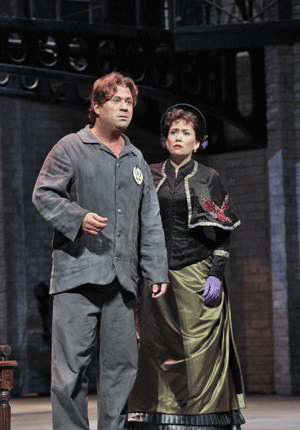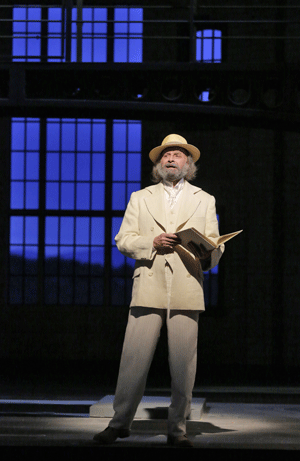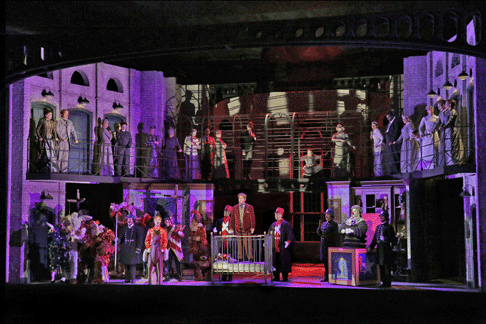13 Aug 2013
Oscar: A Viable New Opera
Oscar Wilde wrote: “We are each our own devil, and we make this world our hell.” On July 27, 2013, Theodore Morrison’s opera Oscar had its world premiere at Santa Fe.

Oscar Wilde wrote: “We are each our own devil, and we make this world our hell.” On July 27, 2013, Theodore Morrison’s opera Oscar had its world premiere at Santa Fe.
The opera deals with Oscar Wilde’s decision to stay in England and face trial on grounds of “gross indecency” when he could easily have slipped away to France.
 David Daniels as Oscar Wilde and Heidi Stober as Ada Leverson
David Daniels as Oscar Wilde and Heidi Stober as Ada Leverson
In 1893, before his trial and incarceration, Oscar Wilde wrote in The Duchess of Padua: "We are each our own devil, and we make this world our hell." If only he had capitulated and fled to France… but then that was not in his character.
On July 27, 2013, Theodore Morrison’s opera Oscar had its world premiere at Santa Fe but I did not see it until the third performance on August 9th. The opera deals with Oscar Wilde’s decision to stay in England and face trial on grounds of “gross indecency” when he could easily have slipped away to France. The work depicts his conviction, his two years at Reading Gaol and his release into a Victorian society that was not ready to accept him. The role of Oscar was written for countertenor David Daniels and it was a fine showcase for his talent.
John Cox and Theodore Morrison's opera begins as narrator Walt Whitman, portrayed by Dwayne Croft, tells of his encounter with Wilde who was in the United States on a lecture tour. He gives us some necessary background on the events that culminated in the infamous trial. By encouraging accurate character portrayals, director Kevin Newbury transported the audience back into Victorian London and showed some of the horrors of that era. David Korins’ scenery, much of which looked like wrought iron, was readily mobile and allowed quick changes of the stage picture from hotel lobby to home and from courtroom to prison. David C. Woolard’s costumes placed the action firmly in the final decade of the nineteenth century.
 Dwayne Croft as Walt Whitman
Dwayne Croft as Walt Whitman
David Daniels was a most sympathetic Oscar. He sang with exquisite phrasing and the sweet tones for which he is most justly famous. Wearing all white as the spirit of Whitman who had died before the opera takes place, Croft was a commanding character who pointed out the salient parts of Wilde’s story with robust dark tones. Heidi Stober sang the lyrical role of Ada Leverson with easy high notes, and her voice soared over the orchestra with a lustrous, radiant sound. In a circus of a courtroom, Kevin Burdette was a comical Jack-in-the-box as Mr. Justice Sir Alfred Willis. Later he returned as a dark toned, evil-minded prison governor.
Lyric tenor William Burden was an understanding Frank Harris whose beauty of tone signified his compassion. It was he who tried valiantly to help Oscar. First he offered to take him to France on a private yacht. His lover, Bosie, was already there. Dancer Reed Luplau portrayed Bosie as imagined by Oscar. Dancing Seán Curran’s choreography, Luplau gracefully whirled and jumped about in what would have been uncomfortably confining spaces for most dancers. His athletic portrayal allowed the audience to see Oscar’s vision of Bosie, the man the Irish poet loved with all his heart. Since Oscar would not agree to run away, Harris used his political influence to ameliorate prison conditions for him and for others like him.
Tenor Aaron Pegram and apprentice bass Rocky Sellars were nasty detectives and sadistic prison warders. Written for Santa Fe, this opera had a great many small parts for the company’s numerous talented apprentices. Ricardo Rivera was a spineless hotel clerk, Patrick Guetti an obsequious butler, and Yoni Rose a tough bailiff. Reuben Lillie was an implacable jury foreman, Christian Sanders an unsympathetic chaplain, while David Blalock and Benjamin Sieverding were infirmary patients whose own tragedies formed interlocking puzzle parts with Oscar’s sad tale.
 The Trial
The Trial
Evan Rogister conducted the most excellent Santa Fe Opera Orchestra in this performance of Morrison’s first opera. Since the composer had written numerous choral works, he was accustomed to writing for the voice, but it was his orchestration that fascinated me. In the first act, the writing was often bi tonal with some excursions into coloratura to showcase the countertenor’s ability to sing florid music. Although we could occasionally hear sonorities that were reminiscent of Ravel, Stravinsky, and Richard Strauss, generally the music was in Morrison’s own particular style. Act One seemed a bit long, but the second act kept the audience’s interest all the way to the end. Rogister and the orchestra played Morrison’s difficult music as though it was a walk in the park but we know it must have taken a great deal of time to learn. Oscar was co-commissioned by the Santa Fe Opera and the Opera Company of Philadelphia, which will stage it in 2015.
Maria Nockin
Cast and production Information:
Walt Whitman, Duane Croft; Oscar Wilde, David Daniels; Bosie, Reed Luplau; Detectives, Aaron Pegram and Rocky Sellers; Hotel Manager, Ricardo Rivera; Ada Leverson, Heidi Stober; Leggatt the Butler, Patrick Guetti; Frank Harris, Willian Burden; Bailiff, Yoni Rose; Mr. Justice Sir Alfred Willis, Kevin Burdette; Jury Foreman, Reuben Lillie; Prison Warders, Aaron Pegram and Rocky Sellers; Colonel Isaacson, Kevin Burdette; Chaplain, Christian Sanders; Infirmary Patients, David Blalock and Benjamin Sieverding; Warder Thomas Martin, Ricardo Rivera. Conductor, Evan Rogister; Director Kevin Newbury; Scenic Design, David Korins; Costume Design, David C. Woolard; choreographer, Seán Curran; Chorus Master Susanne Sheston.